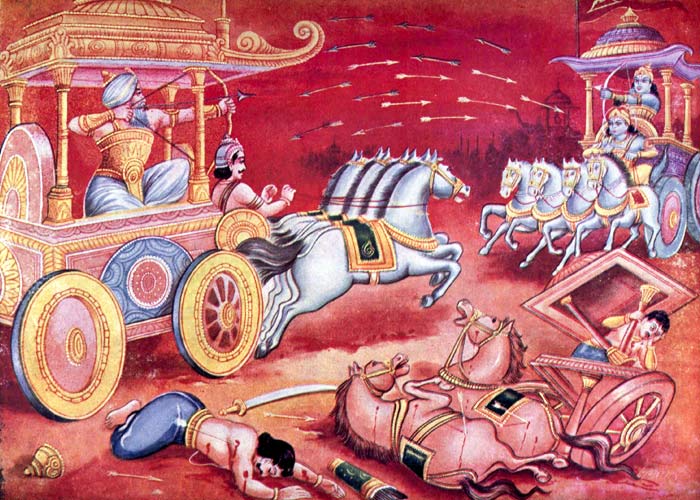This is the Part 3 of the Bhagavad Gita Weekly series. You can read Part 1 and Part 2 if you’ve not read it yet.
We have already looked at the Gita chapter 1, verses 1 to 10 where Sanjaya was describing what was happening at the Kurukshetra battlefield in detail to his King, Dhritarashtra. In this part, let us look at verses 11 to 20 of the chapter 1.
Jump to the Commentary for Chapter 1, verses 11 to 20
Jump to the Story of the Birth of Shikhandi and Their Vow to Kill Bhishma
Jump to the Story of Lord Hanuman on the Banner of Arjuna’s Chariot, Kapi Dhwaja
Chapter 1, Verse 11
अयनेषु च सर्वेषु
यथाभागमवस्थिताः।
भीष्ममेवाभिरक्षन्तु
भवन्तः सर्व एव हि।।
ayaneṣu ca sarveṣu
yathā-bhāgam avasthitāḥ
bhīṣmam evābhirakṣantu
bhavantaḥ sarva eva hi
All of you must now give full support to Grandfather Bhīṣma, as you stand at your respective strategic points of entrance into the phalanx of the army.
Chapter 1, Verse 12
तस्य संजनयन्हर्षं
कुरुवृद्धः पितामहः।
सिंहनादं विनद्योच्चैः
शङ्खं दध्मौ प्रतापवान्।।
tasya sañjanayan harṣaṁ
kuru-vṛddhaḥ pitāmahaḥ
siṁha-nādaṁ vinadyoccaiḥ
śaṅkhaṁ dadhmau pratāpavān
Then Bhīṣma, the great valiant grandsire of the Kuru dynasty, the grandfather of the fighters, blew his conch shell very loudly, making a sound like the roar of a lion, giving Duryodhana joy.
Chapter 1, Verse 13
ततः शङ्खाश्च भेर्यश्च
पणवानकगोमुखाः।
सहसैवाभ्यहन्यन्त
स शब्दस्तुमुलोऽभवत्।।
tataḥ aṅkhā ca bherya ca
paṇavānaka-gomukhāḥ
sahasaivābhyahanyanta
sa abdas tumulo ’bhavat
After that, the conch shells, drums, bugles, trumpets and horns were all suddenly sounded, and the combined sound was tumultuous.
Chapter 1, Verse 14
ततः श्वेतैर्हयैर्युक्ते
महति स्यन्दने स्थितौ।
माधवः पाण्डवश्चैव
दिव्यौ शङ्खौ प्रदध्मतुः।।
tataḥ vetair hayair yukte
mahati syandane sthitau
mādhavaḥ pāṇḍava caiva
divyau aṅkhau pradadhmatuḥ
On the other side, both Lord Kṛṣṇa and Arjuna, stationed on a great chariot drawn by white horses, sounded their transcendental conch shells.
Chapter 1, Verse 15
पाञ्चजन्यं हृषीकेशो
देवदत्तं धनंजयः।
पौण्ड्रं दध्मौ महाशङ्खं
भीमकर्मा वृकोदरः।।
pāñcajanyaṁ hṛṣTkeśo
devadattaṁ dhanañ-jayaḥ
pauṇḍraṁ dadhmau mahā-śaṅkhaṁ
bhTma-karmā vṛkodaraḥ
Lord Kṛṣṇa blew His conch shell, called Pāñcajanya; Arjuna blew his, the Devadatta; and Bhīma, the voracious eater and performer of herculean tasks, blew his terrific conch-shell, called Pauṇḍra.
Chapter 1, Verse 16 to 18
अनन्तविजयं राजा
कुन्तीपुत्रो युधिष्ठिरः।
नकुलः सहदेवश्च
सुघोषमणिपुष्पकौ।।
anantavijayaṁ rājā
kuntī-putro yudhiṣṭhiraḥ
nakulaḥ sahadevaś ca
sughoṣa-maṇipuṣpakau
काश्यश्च परमेष्वासः
शिखण्डी च महारथः।
धृष्टद्युम्नो विराटश्च
सात्यकिश्चापराजितः।।
kāśyaś ca parameṣv-āsaḥ
śikhaṇḍī ca mahā-rathaḥ
dhṛṣṭadyumno virāṭaś ca
sātyakiś cāparājitaḥ
द्रुपदो द्रौपदेयाश्च
सर्वशः पृथिवीपते।
सौभद्रश्च महाबाहुः
शङ्खान्दध्मुः पृथक्पृथक्।।
drupado draupadeyāś ca
sarvaśaḥ pṛthivī-pate
saubhadraś ca mahā-bāhuḥ
śaṅkhān dadhmuḥ pṛthak pṛthak
King Yudhiṣṭhira, the son of Kuntī, blew his conch shell, the Ananta-vijaya, and Nakula and Sahadeva blew the Sughoṣa and Maṇipuṣpaka. That great archer the King of Kāśī, the great fighter Śikhaṇḍī, Dhṛṣṭadyumna, Virāṭa, the unconquerable Sātyaki, Drupada, the sons of Draupadī, and others, O King, such as the mighty-armed son of Subhadrā, all blew their respective conch shells.
Chapter 1, Verse 19
स घोषो धार्तराष्ट्राणां
हृदयानि व्यदारयत्।
नभश्च पृथिवीं चैव
तुमुलो व्यनुनादयन्।।
sa ghoṣo dhārtarāṣṭrāṇāṁ
hṛdayāni vyadārayat
nabhaś ca pṛthivīṁ caiva
tumulo ’bhyanunādayan
The blowing of these different conch shells became uproarious. Vibrating both in the sky and on the earth, it shattered the hearts of the sons of Dhṛtarāṣṭra.
Chapter 1, Verse 20
अथ व्यवस्थितान् दृष्ट्वा
धार्तराष्ट्रान्कपिध्वजः।
प्रवृत्ते शस्त्रसंपाते
धनुरुद्यम्य पाण्डवः।।
हृषीकेशं तदा वाक्यमिदमाह महीपते।
atha vyavasthitān dṛṣṭvā
dhārtarāṣṭrān kapi-dhvajaḥ
pravṛtte astra-sampāte
dhanur udyamya pāṇḍavaḥ
hṛṣīke aṁ tadā vākyam idam āha mahī-pate
At that time Arjuna, the son of Pāṇḍu, seated in the chariot bearing the flag marked with Hanumān, took up his bow and prepared to shoot his arrows. O King, after looking at the sons of Dhṛtarāṣṭra drawn in military array, Arjuna then spoke to Lord Kṛṣṇa these words.
Commentary for Chapter 1, verses 11 to 20
We looked at the Gita chapter 1, verses from 1 to 10 in the previous part and ended it by saying, how Duryodhana was hopeful that their army was definitely capable enough to win the Kurukshetra war against the Pandavas. However, Duryodhana’s deep fear is also expressed in those same lines. He wasn’t 100% confident about winning this war, regardless of the fact that he had Bhishma, Dronacharya and many other greatest warriors on his side.
Why was Duryodhana not confident? He somehow knew that many of them who were fighting alongside him against the Pandavas were fighting a half minded fight. They were not fully there with the Kauravas nor they’re with the Pandavas. Bhishma and these other great warriors equally adored the Pandavas.
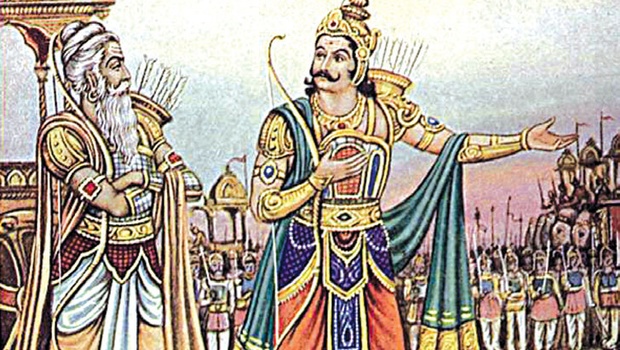
Before the war began, Yudhisthira goes to seek blessings from his elders. And he went to seek blessings from Bhishma who was one of the eldests in the family and their great grandfather. Bhishma blesses Yudhisthira with all the success in this war.
Bhishma was a great man. He didn’t allow any of the Pandavas to be killed in the beginning of the war as he loved all of them very dearly. At the same time, he didn’t allow any of the Kauravas too to be killed, because he loved them too very dearly. Bhishma wasn’t fighting the war for Kauravas’ victory. He had no choice but to take part in this war on the side of Kauravas due to his vow that no matter who sits on the throne, his allegiance would be to that throne and that he would serve dutifully to the kingdom.
Duryodhana was so upset with Bhishma and accused him of not fighting with his full might and with the intention to defeat the Pandavas. These accusations made Bhishma so angry that he took a vow that the next day of the war, he would either kill Arjuna or ensure that Lord Krishna breaks his vow of not taking up arms during this war.
The next day, Kurukshetra saw an extraordinary battle between Bhishma and Arjuna. Bhishma’s arrows came like a rainfall and broke Arjuna’s armour and the bowstring of the Gandiva – the very powerful bow made by Lord Brahma and gifted to Arjuna by Lord Agni – rendering Arjuna completely helpless. When Bhishma was about to kill Arjuna, Lord Krishna lifted a chariot wheel and threatened Bhishma. Arjuna pleaded Krishna to not take up arms and break his vow and promised him that he would double up his battle and fight Bhishma himself.
Lord Krishna knew that there is no way Arjuna could defeat Bhishma and the war eventually came to a standstill. Lord Krishna advised the Pandavas to go and meet Bhishma and ask him for ways to get the war out of stalemate.
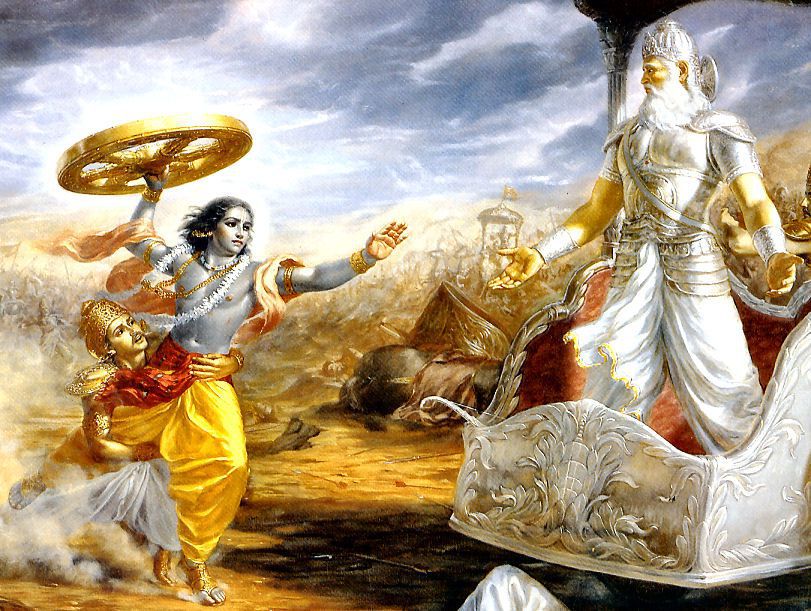
Bhishma loved the Pandavas so deeply and he knew that he was the only person who stood in between Pandavas and their victory in this Kurukshetra war. He gave the Pandavas a hint as to how he could be killed. He told them that, if there is anyone who was once a woman standing in front of him to fight him, he would drop all his weapons and stop fighting.
The Pandavas informed this to Lord Krishna who then asked them to get the help of Shikhandi who had taken a vow to kill Bhishma.
Bhishma couldn’t be killed that easily! Shantanu, Bhishma’s father, had given him a supernatural power of Svecchamrityu, meaning, Bhishma would die only when he wishes to die!
Duryodhana knew that Bhishma’s love for Pandavas was too deep that there was no way Bhishma would fight this war with the intention to defeat the Pandavas. That fear was visible in the way he was describing,
“aparyāptaṁ tad asmākaṁ balaṁ bhīṣmābhirakṣitam…
paryāptaṁ tv idam eteṣāṁ balaṁ bhīmābhirakṣitam”
That is why he compares Bhishma to Bhima even though they cannot be compared at all! Both Bhishma and Bhima are great warriors but Bhima was never an equal to his Great Grandfather, Bhishma!
Bhishma had no choice but to fight with the Kauravas due to his vow that required his allegiance to the throne regardless of who becomes the king, but he loved both sides equally, thus making him fight this war half-heartedly alongside the Kauravas against the Pandavas. However, Bhima was with the Pandavas fully throughout his life and his allegiance to the Pandavas is unshakable.
Let us now look at verses from 11 to 20 of the chapter 1 of the Gita.
Sanjaya continues to describe what was happening at the battlefield and about the conversation between Duryodhana and Dronacharya. After professing about the powers of Bhishma, Duryodhana was asking Dronacharya and everyone else to protect Bhishma and also not lose sight of the strategic points of entrance into the phalanx of the army. Again, Duryodhana knew why it was so important to protect Bhishma, because he was the only person who was capable of helping him win this war.
Why was Duryodhana so worried that the very person who supposed to protect all of them needed protection by them? That is another story, the story of Shikhandi.
The Story of the Birth of Shikhandi and Their Vow to Kill Bhishma
Bhishma, in his attempt to find a suitable bride for his half-brother and the young king, Vichitravirya, abducted princesses Amba, Ambika and Ambalika of Kashi, today’s Varanasi. The eldest one, Amba was in love with Salwa, the ruler of Saubala. Salwa tried to prevent Amba from being abducted and fought with Bhishma and lost very badly.
After reaching Hastinapura, Amba tells Bhishma that she is in love with Salwa and only wish to marry him. So, Bhishma let her go to Salwa. Amba then went back to Salwa. However, Salwa rejected her by saying that she was abducted from him after being humiliated and defeated by Bhishma and that he can’t accept her back.
Burning with Anger, Amba went back to Bhishma, told him what happened to her and asked him to marry her. Bhishma said that he has taken a vow of nitya-brahmacharya – lifelong celibacy – and that he can’t marry her or anyone else for that matter!
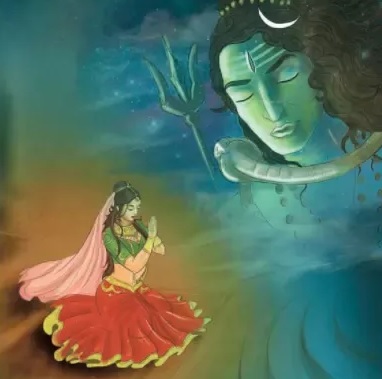
Furious Amba then went to meet Sage Parasurama who was also one of the teachers of Bhishma, hoping that he would manage to convince Bhishma to marry her. Sage Parasurama, after hearing about what happened to Amba, called Bhishma and asked him to marry her. But Bhishma said, he cannot marry anyone due to his vow of lifelong celibacy.
Parasurama got so angry and asked Bhishma to either obey him or to fight him. Bhishma, being the one who would never break his words, no matter what happens, told Parasurama that they should rather fight than he breaking his vow.
They both got into a massive fight which lasted for 23 days with no conclusion. They both were extremely powerful and there was no way for either of them to win. Sage Narada intervened and pleaded to Parashurama to end the fight. The gods then declared their fight to be a draw.
Parasurama went and explained to Amba and asked her to give up on Bhishma and find someone else. However, Amba was furious and had no plans to give up. She resorted to severe penance to please Lord Shiva to help her. Lord Shiva gave her a boon that she would be born as a man named, Shikhandi, and would play a critical role in killing Bhishma.
Lord Rama had established a Shivling and sought blessings from Lord Shiva at Rameshwaram before he went to Lanka in search of Sita Devi. The bridge, now known as Rama Setu, which Lord Rama and the army used to cross to Lanka was built by Lord Hanuman and an army of monkeys using trees and stones.
Looking at the remainings of the bridge, recalling all the stories Lord Krishna and others told him about what a great warrior Lord Rama was and his heroic qualities, Arjuna’s heart wondered with so much devotion, “why would Lord Rama, who was one of the greatest archers, seek help from mere monkeys to build a bridge? Why couldn’t Lord Rama himself build a bridge simply by his arrows..?”
There was a small monkey who had been following Arjuna and his pilgrims for a while and he realised the question in Arjuna’s mind and told him why Lord Rama had to seek the help of the monkeys. The monkey said, “there were many Stalwarts like Sugreeva, Hanuman, Nala, Neela and Angada, etc. who adorned their ranks in Lord Rama’s army that set out in search of Sita Devi. No bridge of arrows could have withstood their might and weight…”
This small monkey went on to even challenge Arjuna by saying, “…forget about such stalwarts I just mentioned, a bridge of arrows would not even withstand my weight even though how puny as I am..!!”
Arjuna without any second thought, took up this challenge and told the monkey, “I shall build a bridge of arrows and you try to cross over it. If the bridge collapses due to your weight, I am willing to burn myself to death.”
Monkey laughed at him and took up this challenge. Arjuna shot arrows from his inexhaustible quiver and created a bridge. The monkey walked on it and it collapsed in no time. Arjuna asked for another try and created another bridge with his arrows, this time around, laying his arrows closer to each other, ensuring that it was stronger than before. The monkey walked on it again and it collapsed even the second time!
Arjuna was ashamed of himself and set out to prepare a pyre and was about to jump and kill himself as promised to the monkey during their bet. That was when a small boy appeared from nowhere and asked Arjuna about what was happening. Arjuna explained to the boy what happened and how ashamed he was of himself and that he was going to kill himself without any further delay.
The boy asked Arjuna to wait and asked, “so, you mean to say that there was no judge during this contest between you and the monkey..? How can any contest be considered win or lose without a judge?”
This made sense to Arjuna and he took the boy and went to meet the monkey again and explained this to him. The monkey also felt that it is true and agreed to give Arjuna another chance.
This time around, Arjuna shot his arrows again, laying it even closer than before, ensuring the bridge built by his arrows was stronger than before and asked the monkey to try crossing it again. The boy was standing there and smiling while the monkey started to cross the bridge made by arrows. The bridge stood solid! The monkey even tried to jump and dance on the bridge of arrows made by Arjuna and it still stood strong! Both Arjuna and the monkey couldn’t believe their eyes and was completely puzzled as the boy stood there and smiled!
The monkey then decided to take his real form and grew his body like a huge mountain. The monkey was none other than Lord Hanuman! Yet, the bridge stood stronger, without collapsing!
Arjuna, realising his mistake of challenging Lord Hanuman, bowed to seek forgiveness. Hanuman blessed Arjuna.
But Hanuman too were perplexed as to why the bridge was not collapsing! There was no logical reason for the bridge of arrows to not collapse when Lord Hanuman himself is jumping on it with his mighty body!
They both realised that the boy couldn’t be any ordinary person! They fell at the feet of the boy who then took the form of Lord Vishnu and sought blessings!
Lord Vishnu said to Hanuman and Arjuna, “I am Rama and I am Krishna. I protected the bridge from collapsing, Arjuna. Vanity undo the best of men…
Dear Hanuman, you should have known better than to humiliate Arjuna thus. You know that he is a great warrior and one of the bests of his times! How could you drive him into giving up his life this way?”
On the other hand, the king Drupad – the king of Panchala – wanted to have a son and prayed to Lord Shiva to give him a son. After much prayers, a daughter was born to him and was named Shikhandini. Drupad prayed to Lord Shiva again and told him that he was promised a son but why was he given a daughter instead! Lord Shiva asked him not to worry and that his daughter would eventually become a man. That was how Shikhandi was born who later on became the charioteer of Arjuna on the 10th day of the battle as instructed by Lord Krishna and played a major role in killing Bhishma.
Duryodhana knew about Shikhandi and that if Shikhandi comes to fight with Bhishma, he would drop his weapons and stop fighting. That was why, Duryodhana tells Dronacharya to protect Bhishma at any cost.
Bhishma, being such a great, noble man, could understand the worry of his beloved grandson, Duryodhana. So as to cheer him up, Bhishma blew his conch shell like a thundering lion, befitting to his stature as a great warrior.
Once after Bhishma blew his conch shell, like a roaring lion, others too started blowing their conch shells. Along with it, some others started playing their drum, bugles, trumpets and horns, creating a joyous ceremony to show the beginning of the war.
In the Gita, Chapter 1, verses from 1 to 13, Sanjaya talks about what is happening on the Kaurava side.
Sanjaya is now going to explain what is happening on the side of Pandavas’.
Lord Krishna and his most beloved friend, Arjuna, are seated on their chariot, Kapi Dhwaja, drawn by four white horses named Saibya, Sugriva, Meghapuspa, Balahaka. The beautiful Kapi Dhwaja was gifted to Arjuna by Lord Agni, and this chariot was capable of going to all directions and conquer all the worlds. The name Kapi Dhwaja means, the chariot having the flag of a monkey. And who was that monkey? It was none other than Lord Hanuman!
How did Lord Hanuman end up in Mahabharata and on the flag of Arjuna’s Chariot? It is another beautiful story and brought tears into my eyes as I first read this story!
The Beautiful Story of Lord Hanuman on the Banner of Arjuna’s Chariot, Kapi Dhwaja
There was once Arjuna came to Rameshwaram, located in today’s Pamban Island, in the southeast Indian state of Tamil Nadu, during his pilgrimage to various places. Arjuna had heard a lot of stories about Lord Rama from Bhishma and Krishna. Arjuna heard numerous other stories of Lord Rama from Sage Markandeya during Pandavas’ 13 years of exile in the forests.
Lord Rama had established a Shivling and sought blessings from Lord Shiva at Rameshwaram before he went to Lanka in search of Sita Devi. The bridge, now known as Rama Setu, which Lord Rama and the army used to cross to Lanka was built by Lord Hanuman and an army of monkeys using trees and stones.
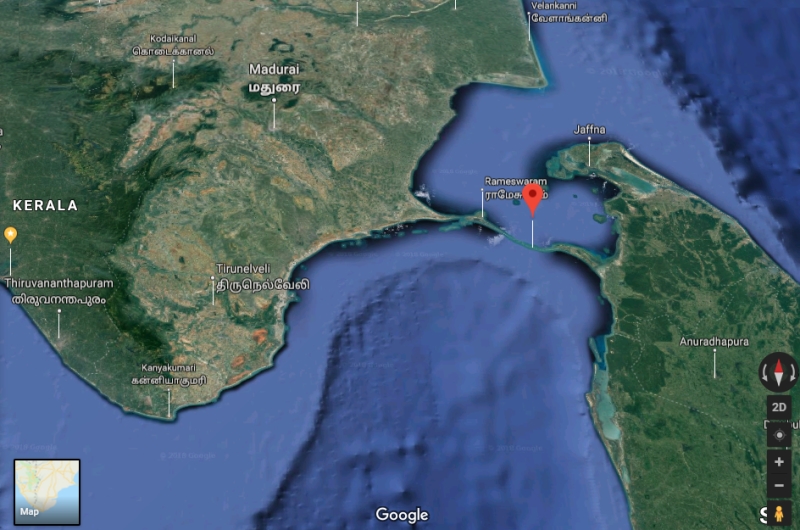
Looking at the remainings of the bridge, recalling all the stories Lord Krishna and others told him about what a great warrior Lord Rama was and his heroic qualities, Arjuna’s heart wondered with so much devotion, “why would Lord Rama, who was one of the greatest archers, seek help from mere monkeys to build a bridge? Why couldn’t Lord Rama himself build a bridge simply by his arrows..?”
There was a small monkey who had been following Arjuna and his pilgrims for a while and he realised the question in Arjuna’s mind and told him why Lord Rama had to seek the help of the monkeys. The monkey said, “there were many Stalwarts like Sugreeva, Hanuman, Nala, Neela and Angada, etc. who adorned their ranks in Lord Rama’s army that set out in search of Sita Devi. No bridge of arrows could have withstood their might and weight…”
This small monkey went on to even challenge Arjuna by saying, “…forget about such stalwarts I just mentioned, a bridge of arrows would not even withstand my weight even though how puny as I am..!!”
Arjuna without any second thought, took up this challenge and told the monkey, “I shall build a bridge of arrows and you try to cross over it. If the bridge collapses due to your weight, I am willing to burn myself to death.”
Monkey laughed at him and took up this challenge. Arjuna shot arrows from his inexhaustible quiver and created a bridge. The monkey walked on it and it collapsed in no time. Arjuna asked for another try and created another bridge with his arrows, this time around, laying his arrows closer to each other, ensuring that it was stronger than before. The monkey walked on it again and it collapsed even the second time!
Arjuna was ashamed of himself and set out to prepare a pyre and was about to jump and kill himself as promised to the monkey during their bet. That was when a small boy appeared from nowhere and asked Arjuna about what was happening. Arjuna explained to the boy what happened and how ashamed he was of himself and that he was going to kill himself without any further delay.
The boy asked Arjuna to wait and asked, “so, you mean to say that there was no judge during this contest between you and the monkey..? How can any contest be considered win or lose without a judge?”
This made sense to Arjuna and he took the boy and went to meet the monkey again and explained this to him. The monkey also felt that it is true and agreed to give Arjuna another chance.
This time around, Arjuna shot his arrows again, laying it even closer than before, ensuring the bridge built by his arrows was stronger than before and asked the monkey to try crossing it again. The boy was standing there and smiling while the monkey started to cross the bridge made by arrows. The bridge stood solid! The monkey even tried to jump and dance on the bridge of arrows made by Arjuna and it still stood strong! Both Arjuna and the monkey couldn’t believe their eyes and was completely puzzled as the boy stood there and smiled!
The monkey then decided to take his real form and grew his body like a huge mountain. The monkey was none other than Lord Hanuman! Yet, the bridge stood stronger, without collapsing!
Arjuna, realizing his mistake of challenging Lord Hanuman, bowed to seek forgiveness. Hanuman blessed Arjuna.
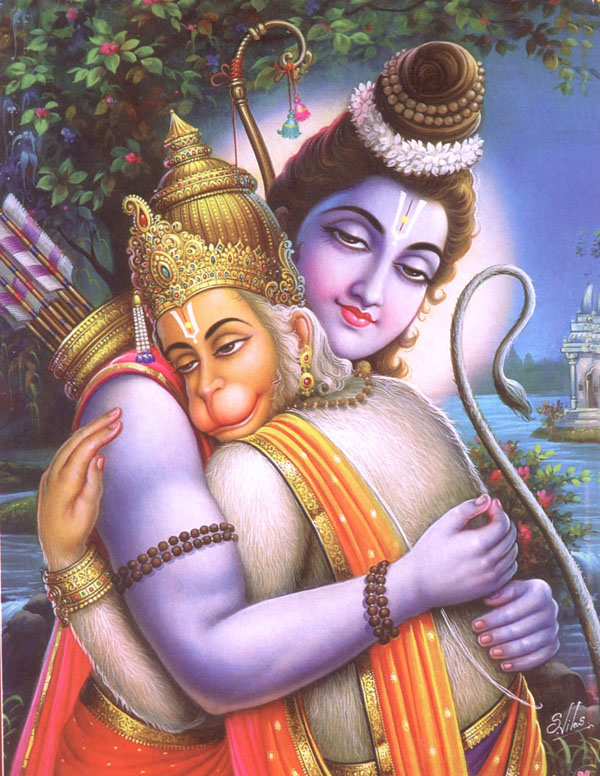
But Hanuman too were perplexed as to why the bridge was not collapsing! There was no logical reason for the bridge of arrows to not collapse when Lord Hanuman himself is jumping on it with his mighty body!
They both realised that the boy couldn’t be any ordinary person! They fell at the feet of the boy who then took the form of Lord Vishnu and sought blessings!
Lord Vishnu said to Hanuman and Arjuna, “I am Rama and I am Krishna. I protected the bridge from collapsing, Arjuna. Vanity undo the best of men…
Dear Hanuman, you should have known better than to humiliate Arjuna thus. You know that he is a great warrior and one of the bests of his times! How could you drive him into giving up his life this way?”
Lord Hanuman realised his mistake and sought for forgiveness from Lord Krishna and promised him that as an act of remorse, he himself would sit on Arjuna’s chariot and stabilise it and protect it during the war that has now become imminent. Thus Lord Krishna allows Hanuman to be seated on the banner of Arjuna’s chariot!
Look at how much Lord Krishna loves his eternal devotee and dearest friend, Arjuna! It is such a blissful experience to even imagine the relationship between the Lord and his devotee!!!
Going back to the Gita now, on the Pandava side, Lord Krishna and Arjuna are sitting on the chariot, Kapi Dhwaja. Lord Krishna blew his divine conch shell, Panchajanya, in response to Kauravas and Arjuna followed with blowing his conch shell named Devadatta. Bhima, the voracious eater and the one who performs herculean tasks blew his conch shell named Paundra.
The Pandava King, Yudhisthira, blew his conch shell named Anantavijaya and Nakula and Sahadeva blew their conch shells named Sughosha and Manipushpaka respectively.
Lord Krishna is addressed as Hrishikesha, meaning, Lord of all senses, in verse 15 of chapter 1. Being the charioteer of Arjuna, Lord Krishna controls all transcendental senses of Arjuna in the battlefield of Kurukshetra, thus called Hrishikesha!
It is believed that the blowing of the conch shells by Lord Krishna and the Pandavas vibrated throughout the whole earth and the heavens, showing clear signs of eventual victory of Pandavas! Yato dharma tato jaya – where there is Dharma, there alone is victory!
Sanjaya continued describing the scene at the battlefield to Dhritarashtra. He said that the thundering sound of Lord Krishna’s and the Pandavas’ conch shells shattered the hearts of the Kauravas. Sanjaya very tactfully informed King Dhritarashtra that whatever they did to deceive the sons of Pandu and attempting to dethrone them against Dharma was unwise. The signs already clearly shows that this battle would wipe out the whole of Kuru dynasty, including Bhishma and all others.
The great battle was about to begin. Dhritarashtra was already disheartened by the unexpected arrangements of military forces by the Pandavas who were directly guided by none other than Lord Krishna! Wherever the God is, there resides Shri Lakshmi, the goddess of fortune! There is no doubt that the victory would be on the side where Lord Krishna belongs to! And Lord Krishna stands by the side of Dharma!
We will continue again next week…
ॐ पूर्णमदः पूर्णमिदं पूर्णात्पुर्णमुदच्यते
पूर्णस्य पूर्णमादाय पूर्णमेवावशिष्यते ॥
ॐ शान्तिः शान्तिः शान्तिः ॥
Om Puurnnam-Adah Puurnnam-Idam Puurnnaat-Purnnam-Udacyate
Puurnnasya Puurnnam-Aadaaya Puurnnam-Eva-Avashissyate ||
Om Shaantih Shaantih Shaantih ||

